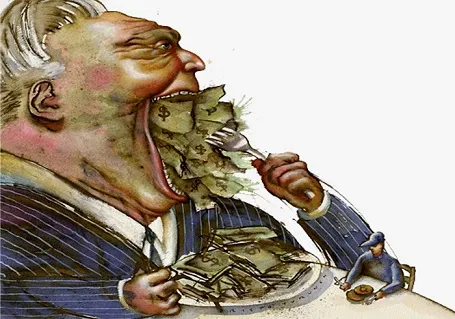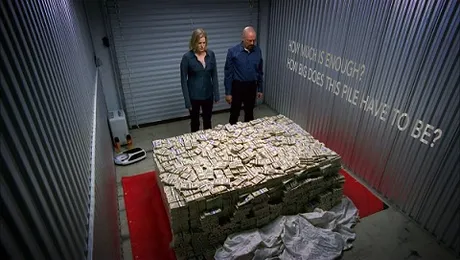It's good to be back after a weekend of visiting family. I always tell myself I'll write some blog posts while I'm on the road but the chance of actually doing it is much lower than expectations.

In any case, the question I would pose today is: How much money is enough? No matter where I look everyone just wants more more moar. The infinite greed is real, and it hits every sector of the economy simultaneously.
Ironically this is especially true in cryptocurrency, a sector that claims it will one day level the playing field and eliminate all the problems associated with greed in the legacy economy. Unfortunately no one seems to actually practice what they preach. 99% of the devs I've seen are much more concerned with how they will extract value from their work rather than just trying to build something cool.
Greed scales better than not.
There's a real and obvious reason why open-source tech has never taken off despite being superior to the closed-source proprietary alternatives. People have wants and needs. Can't pay the bills with sticks and stones.
Only a fool thinks he can solve the world's problems.
Even if we give everything we have and more as individuals, the world's problems will still remain long after we are gone. In fact, as we can see from this Parable, more harm has been done than good from the suicide that was organ donation. Had this person simply stayed the course and made even more money, perhaps that would have mitigated more suffering than simply giving up on life.
And so we see that greed scales and generosity does not.
Because generosity is unsustainable, but greed can feed into itself for generations and even create entire dynasties. The ironic thing about crypto is that we have solved this problem, but the world doesn't seem to realize it yet and continues to implement and adapt the old systems to its own detriment.
Crypto financially incentivizes generosity.
It does not do this automatically, but rather with extremely careful planning and precision. Much like positive reinforcement is much more difficult to implement than negative reinforcement (imperialism), so to is generosity much more difficult to incentivize when compared to greed.
So we find ourselves in this extremely awkward transitionary phase in humanity where no one seems to know what they are doing. Fake it till you make it, amirite? However, we've been provided all the tools required to get to where we need to be. We "simply" have to master those tools and create the templates required to get there.
We've already seen the opening acts of some of these things playing out. Communities are getting forged via airdrops. In the future, millions of people will be gifted billions of dollars simply for paying attention during the rise of the attention economy. The Uniswap airdrop was a defining moment in all of this. Getting over $2000 (now worth $10000) for 'free' was an obvious turning point for the entire industry.
These strategies and business models for creating communities and entire economies can not be copied by the legacy system. Why? Because the legacy system absolutely depends on centralized control and the flow of money constantly being channeled up to the top of the pyramid. It is not sustainable to give every user $2000-$10000 just for existing. Meanwhile, it very much is sustainable to do this within a revolutionary system of decentralized value production. Again, generosity can be monetized within the new system, whereas it absolutely can not in the old one.
Don't give someone a fish: Teach them to fish.
And airdrops are clearly in line with giving someone a fish (or even killing oneself to donate the organs). The real value comes from the jobs and constant passive income streams that can be utilized by these new communities. If I'm being honest we really haven't even scratched the surface in this department so it might be a bit premature to even talk about it. Get paid to ______.

So back to the question:
How much is enough?
I'm seeing people complain recently about Bitcoin gaining a little bit of dominance back. Bitcoin goes up 4% and alts fall 4% and it's the end of the world all over again? Seriously are these people going to just keep doing this until the end of time? The answer is definitively: yes. Even rich people live in constant scarcity; living in abundance is difficult even when the abundance is readily available. It takes a level of discipline that most people simply do not and will never have. This is an unfortunate reality. It is what it is.
For me being in the six figures range money has already pretty much lost all meaning in terms of me as an individual. A scrapper like me with that much money can get a lot done. All I need to do is to have a bit more assurances that the market can't tank from here. It will take a mega-bubble at the end of the year to solidify the range we are in now.
In terms of an individual I am doing just fine. However, in terms of a business owner and/or as a philanthropist looking to enrich the lives of those around me: no amount of money is enough. From this perspective, this isn't a matter of greed, but rather resources to empower communities. There is no limit to the value we can create and the investments that can be done in the future.
Root of all evil.
It's important to realize that money itself isn't evil, but rather a tool that can be used for a full spectrum of utility. The love of money (greed) is where we get into trouble, but as I have described above, even that is often a necessary evil required to scale up society.
Conclusion
At the end of all of this we're going to be forced to take an introspective look at the darkest recesses of society. We reap what we sow, and when the future is founded on transparency, many aren't going to like what they see.
How much is enough?
What is the value of purity and cleansing this toxic environment?
Obviously the cost is too high or we would have done it already.
Capitalism.
Posted Using LeoFinance Beta
Return from How much is enough? to edicted's Web3 Blog
